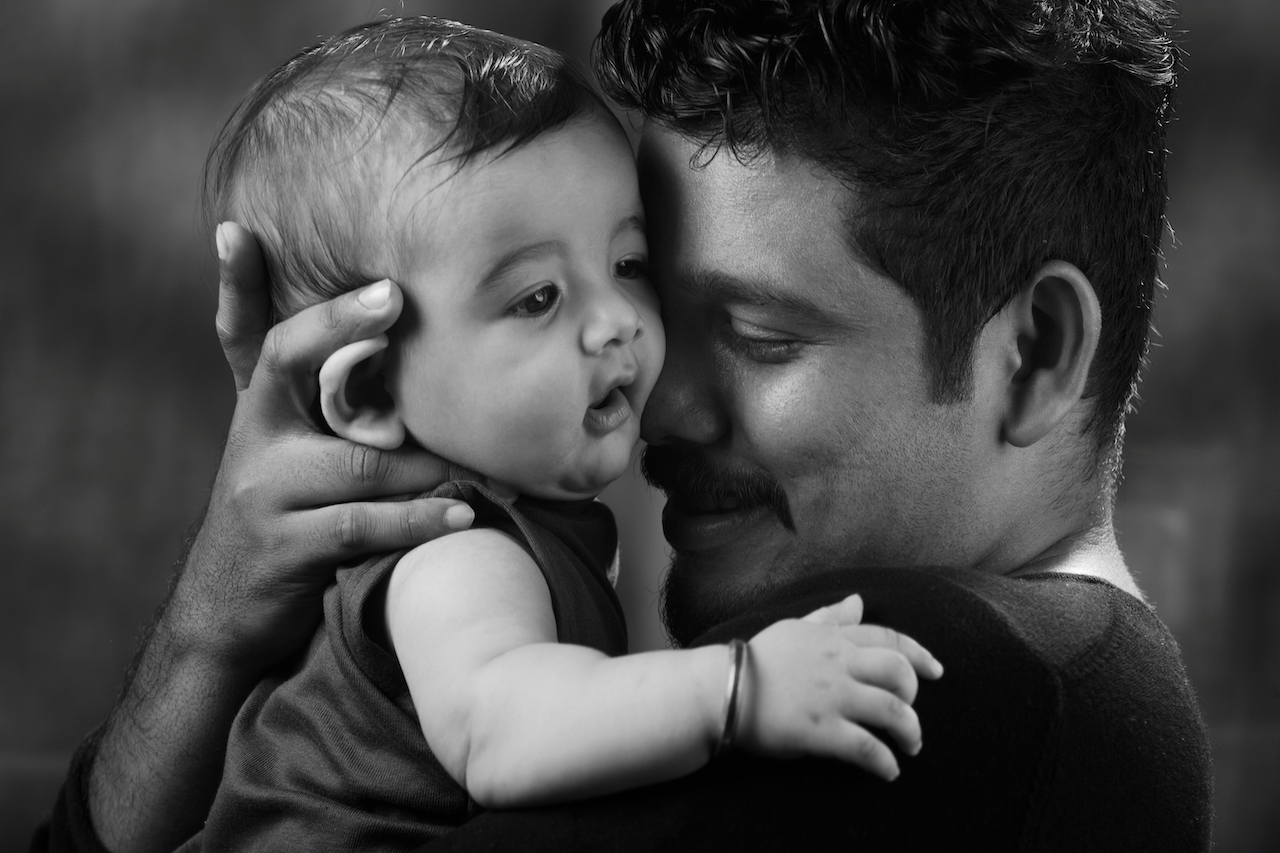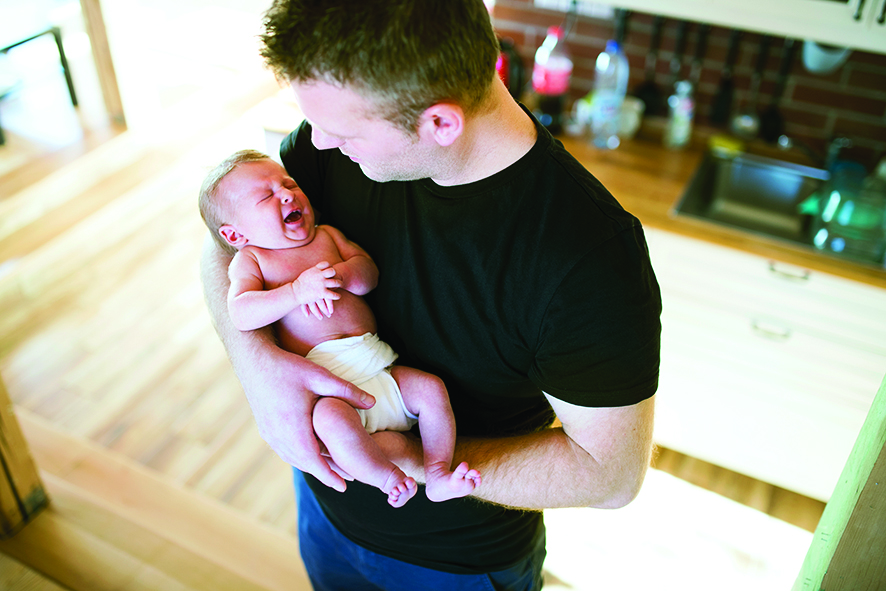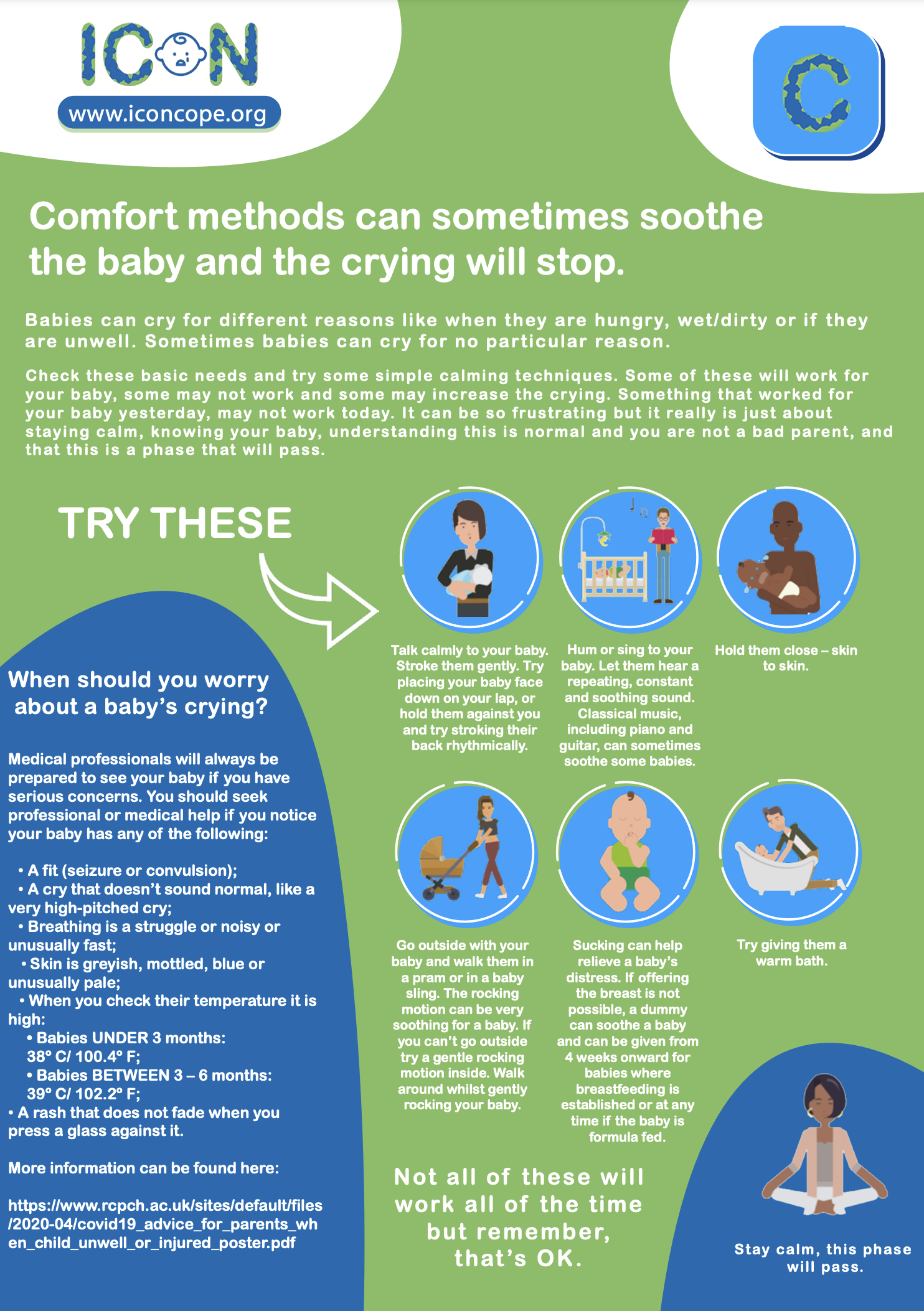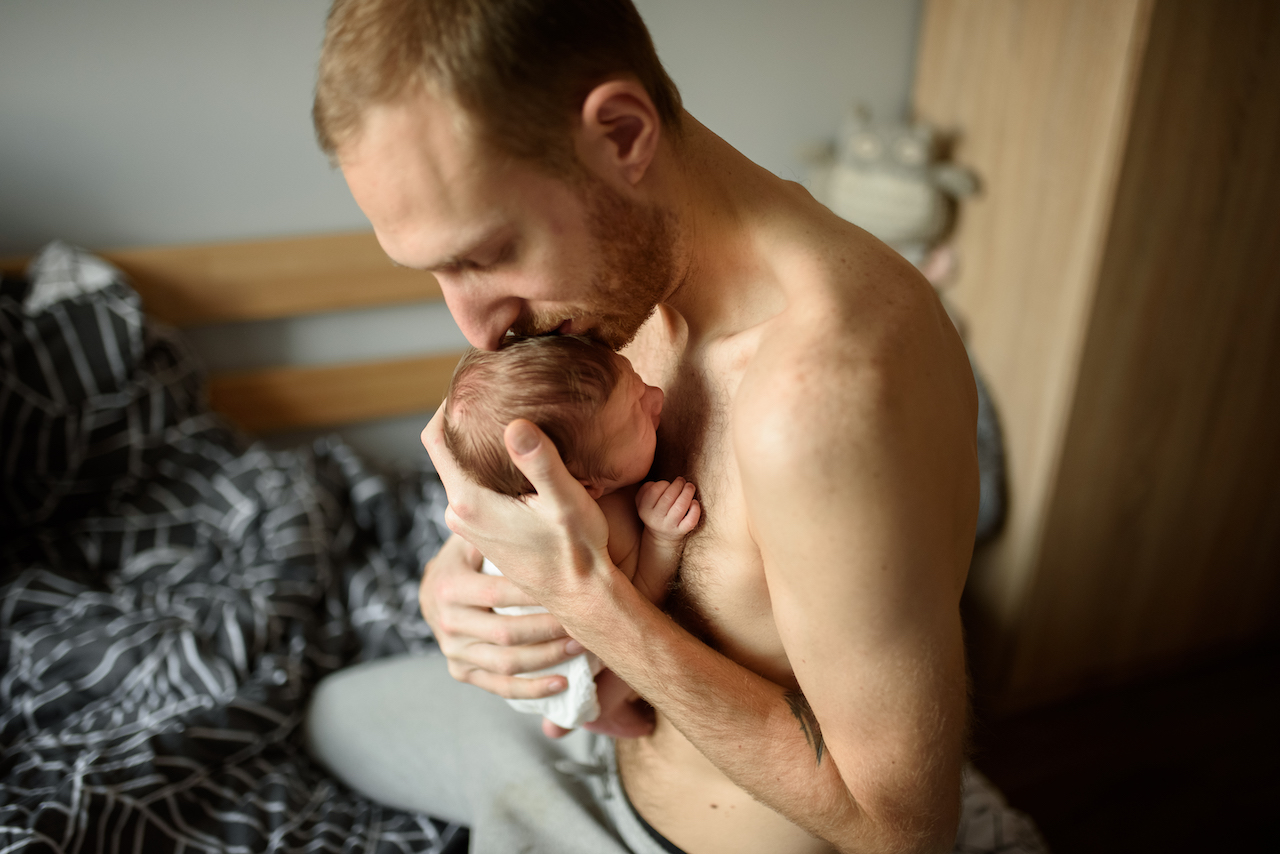
Attachment and Bonding, Mental Health, Parenting Advice
MH: Your role in your infant’s mental health
Posted on 11th June 2021
This year’s Infant Mental Health Awareness Week encourages all who work in areas connected with children and young people’s mental health to think about and include babies, as there is currently perceived to be a “baby blindspot”. So how can you, as a new dad or a dad-to-be, also be involved to help ensure that your baby’s mental health needs are met?
In the definitely-worth-watching Unicef mini parenting master class (below) on How to build your baby’s mental health, psychologist and child development expert Dr Lisa Damour encourages us to:
…start thinking about your child’s mental health right from the moment you meet. From the very beginning, your child will look to you for love, learning and safety. When you provide your child with a warm and tender relationship, help them to feel protected, comfort them when they’re upset and help them navigate the world, that’s how you lay the groundwork for a lifetime of mental health.
We thought it might be helpful to look at each of these points individually, and to consider what we – as parents – can do to achieve them.
[You’ll soon realise that we’ve embedded lots of links to other blog posts in this article and this might make you feel a bit overwhelmed with advice! We’d therefore recommend that you start by reading this blog post all the way through, and then go back and read any of the linked articles later on, as you feel the need for further information and input on some or all of the points raised.]
A warm and tender relationship
As considered in Dr Damour’s video, showing love and affection to our child may not come easily to all of us, especially if we did not receive these things ourselves in our own childhood. However, that doesn’t mean that we’re not still capable of learning to do it.
Dr Damour suggests a number of ways in which you can learn to build a relationship with your baby that you wish you could have experienced yourself, including:
- Being attentive to your baby
- Paying attention to what they need
- Responding to their needs
- Being a warm and steady presence
We’ll explore each of these points in more detail below, as we look at Dr Damour’s other suggestions, but the key thing to remember here is that what you’re working to achieve is a bond, or secure attachment, between you and your baby.
We wrote a blog post all about the importance of secure attachment for last year’s IMHAW and we still believe that this is probably the best and most important thing that any of us can do as a new parent. Having that bond – that attachment – will underpin the relationship we will have with our child for the rest of their lives. It will also give our children the best chance (although, of course, no guarantee) of having the ‘toolkit’ in place to:
- be resilient, confident and adaptable when they are faced with difficult situations;
- have good self-esteem, self-control and the ability to empathise with others; and
- thrive and take advantage of all the opportunities – especially in terms of education – that they receive in life.

Help them to feel protected
There are, obviously, lots of ways in which you can do this, but we’re going to focus here on looking at the ways in which you can take steps to reduce behaviours and practices that increase any risk of harm to your new baby.
Perhaps the most obvious way – and something that we’re always recommending here at DadPad – is to prepare yourself for fatherhood at the earliest possible moment. As soon as you learn that you’re going to become a dad, get hold of a DadPad or (if you’re in an area of the country where it’s available) download the DadPad app onto your phone or tablet. Inside, or on-screen, you’ll be able to to learn all about the basics of baby care – things like secure ways to hold your baby, how to change their nappies, how to support mum with feeding your baby, and how to safely wash and bathe your tiny baby.
DadPad also provides information and support on coping with some of the situations that all new parents find themselves in. This includes things like: coping with crying; coping with lack of sleep (both of which can often feel like a relentless, killer combo, and like some horrific form of torture); and ensuring that your baby is safe when they sleep. Due to the potential for serious danger from all of these situations, we’ve also written specific blog posts on each topic, which we’ve linked in the text above. Additionally, as the crying and/or lack of sleep can often cause many of us to start to lose our temper – which obviously places your baby at risk of harm – we’ve also put together a blog post on ways to keep calm, and don’t also overlook last week’s article which looked at these dangers within the context of ACEs (or Adverse Childhood Experiences).
Aside from these perhaps more extreme circumstances and situations, we’d also recommend taking stock of things like your relationship with your partner/baby’s mum, your own childhood experiences, and your mental health, as you prepare for parenthood. Taking steps to address any issues at the earliest opportunity, in order to minimise the negative impact that any of these might have on your own child. After all, for most of us, becoming a new parent is often one of the best incentives we ever have to work on making changes to our lives (and/or lifestyles) for the better.
In future blogs, we’ll explore some of these latter points in more depth, but – for now – start talking. Talk to close friends about your worries; share with your partner/baby’s mum your expectations of fatherhood, and find out what she might be expecting from you; and reach out to health professionals if you feel that you might benefit from additional input.
We also had a look at Why dads’ mental health matters in a blog post from last year and here you’ll find lots of good reasons why keeping your mental health and wellbeing in as good a place as possible is a really important thing to do.

Comfort them when they’re upset
This one is especially important when you remember that babies will activate a stress response when they are scared, or worried that they’ve been forgotten, or that their needs are not being met.
Many of us will have received advice about not picking baby up every time that she cries, leaving baby to ‘cry it out’, or being told of the dangers of ‘spoiling’ our baby by going to her each time she cries. The reality is that evidence has shown that the longer a baby is left to cry without receiving a response, the more stress that she experiences, which negatively affects her brain development.
Instead, we need to remember that our job as parents – as hard as it can sometimes feel – is to help our babies and young children learn how to calm their stress response, so that baby can more quickly ‘return to normal’, and at the same time appreciate that the world is a safe and secure place to be.
To do this, we need to respond to our baby’s needs, helping them to ‘settle’ whenever they get distressed or overtired. This means remembering to always put baby’s needs before our own, so helping an overtired baby settle to sleep, rather than keeping them stimulated and awake so that we can ‘play’ with them after a long day at work.
Don’t forget that crying is baby’s means of communicating with you, so always start attempting to settle or comfort her by checking whether she has any needs to be me: does her nappy need changing, is she hungry, too hot or too cold, or feeling poorly? Babies can also sometimes cry, though, for no apparent reason, which can make it especially challenging as a parent.
It’s also worth being aware of something called the ‘Early Infant Crying Curve’ which was explained to us by Dr Suzanne Smith from ICON in our interview with her last October. From this, we learn that crying in new babies tends to reach a peak at around 6-8 weeks of age.
If you’re not sure about how best to comfort your baby, the ICON website also includes a link to a digital leaflet (below) which gives some great ideas:

Help them navigate the world
This is an important point for both parents, but especially for dads. We learnt, from evolutionary anthropologist Dr Anna Machin, that’s dad has a unique role as a parent. Like mum, his attachment or bond with baby will include affection and care, but:
…on top of this, there’s an extra bit: his job is to challenge, to be the secure base from which the child goes out into the world to investigate what is going on. His role is to teach the skills – behavioural, linguistic, cognitive – that will enable that child to deal with life’s challenges, assess its risks, and leap over those hurdles; to deal with failure, but also with success… Dad’s job is to turn the child to face the world and say: “Here is the world and I am going to teach you to be successful in it”.
To find out more about how – as a dad – to bond with your baby, to ensure that this secure attachment is formed and to give your child the best chance of developing those abilities, have a read of our blog post from last summer, entitled How do I bond with my baby?. Key suggestions include:
- Skin-to-skin cuddles – this closeness, with baby able to feel and hear your heartbeat, experience your warmth and the smell of you, will help keep her calm and relaxed. It will also help you, as positive hormonal reactions will take place in your brain;
- Providing hands-on care for your baby – no more ducking out of nappy changes! If you’re not confident on what to do, though, get hold of a DadPad or download the DadPad app, and/or have a read of this blog post which gives detailed advice on washing and bathing baby, nappy change and coping with crying;
- Playing and learning together – reading stories together, getting down on the floor and engaging with baby in an age-appropriate manner will all help build your bond; and
- One-to-one, high contact activities, such as baby massage or swimming – developing special ‘dad-and-baby’ times is another great attachment-building idea. To find out more about baby swimming, have a read of our guest blog post written by Ali from Puddle Ducks.

As baby gets older, you can also start to engage in ‘rough and tumble’ play together. This has been shown to be a key, fast-track way for dads to form – or develop – the bond that they share with their children, as well as being a way of helping children learn how to self-regulate (or control) their feelings and emotions. Psychologist Paul Ramchandani, Professor of Play in Education, Development and Learning at Cambridge University, explains how this happens:
You might have to control your strength, learn when things have gone too far – or maybe your father steps on your toe by accident and you feel cross. It’s a safe environment in which children can practice how to respond. If they react the wrong way, they might get told off, but it’s not the end of the world – and next time they might remember to behave differently.
And don’t worry too much if you do end up reprimanding – or even occasionally shouting at – your child as they get older. These are all normal childhood experiences which help our children build resilience, another crucial tool needed to navigate the world around us. As explained by HeadStart Kernow:
Resilience enables us to cope when things are challenging and helps us adapt to changes in a more positive way. Resilience can enable individuals to transform potentially traumatic stress into tolerable stress and therefore can reduce the negative impact a situation has on a person’s life.
So, rather than focusing on trying to avoid any ‘ruptures’ in your relationship with your child (and telling them ‘no’ can often feel like you’ve triggered a massive rupture!), what’s more important for resilience-building is to then take steps – as the child’s care-giver – to repair that rupture. Just as you did when they were a crying baby, your role once again is to provide the comfort and reassurance that they need to return to a calm state. Let them know that it’s all ok, perhaps provide an explanation as to why you had to tell them off or chastise them (“Daddy said ‘no’ because…”), and reassure them that your relationship is still good and strong.
And you should also remember, as Dr Damour explains in the video, that your child is going to be learning all about feelings from you and their other parent(s):
So when you have feelings, especially painful ones, you’re going to want to think about how you express them, to express them in a way that is honest but not overwhelming or frightening. And then you’re going to want to model how you manage having a painful or difficult feeling, such as finding an appropriate way to cope with it, going outside, taking a walk, reaching out to somebody for help.
Being open and honest with our children, in a way that is appropriate to their age and understanding, is therefore a good and positive thing to do. If you find yourself feeling stressed, upset or angry, then learn to recognise and deal with it in a suitable way. ‘Name and tame’ those feelings and consider (safe) ways of taking a ‘time out’ if you need it. Placing a crying baby in a place of safety (such as their cot or Moses basket), telling them “Daddy’s just going to take two minutes, because I’m feeling a bit angry…” and going to another room to calm yourself down – as advised by the ICON programme – is definitely a good thing to do.
You can find out more about helping your child build resilience from the situations they experience as a child (and also how to come to terms with any negative experiences that you might have lived through during childhood), have a read of our blog post from last week.
We really hope that this article has helped give you some ideas on ways in which you can help your baby lay the foundations for good mental health throughout their life, and the ways in which you – as her dad – are so crucial to this. Preparing yourself for fatherhood, reading up on practical and emotional ways in which you can help your baby and her mum, and appreciating even more why #dadsmatter is one of the most important things that you, as a dad-to-be, can do.

